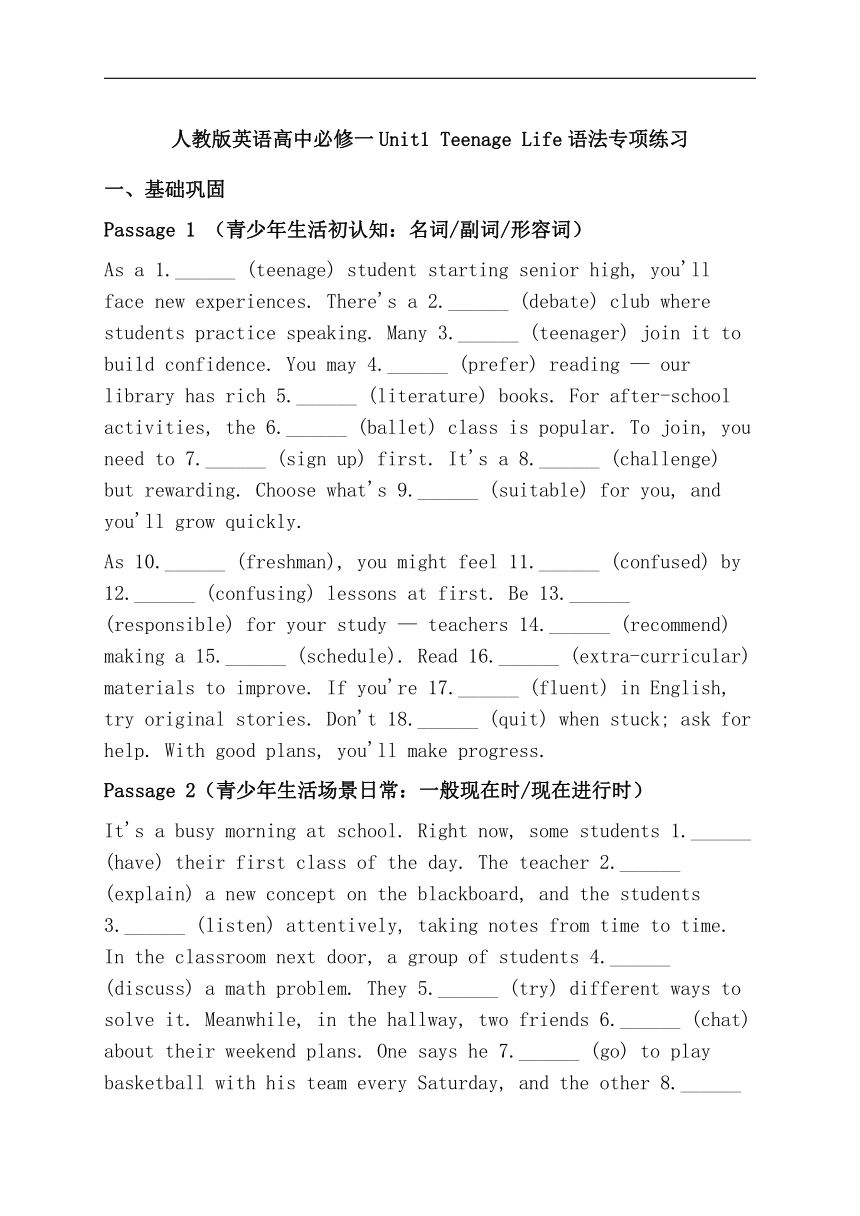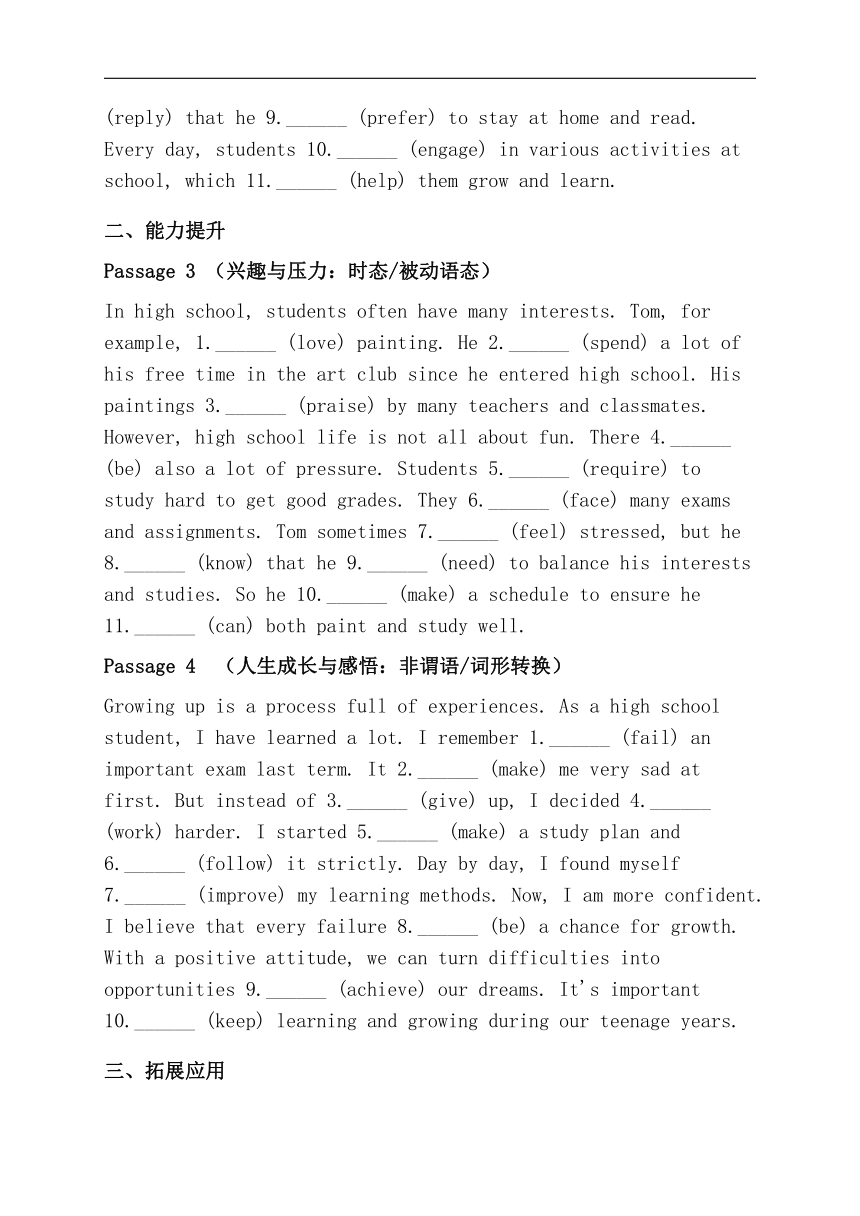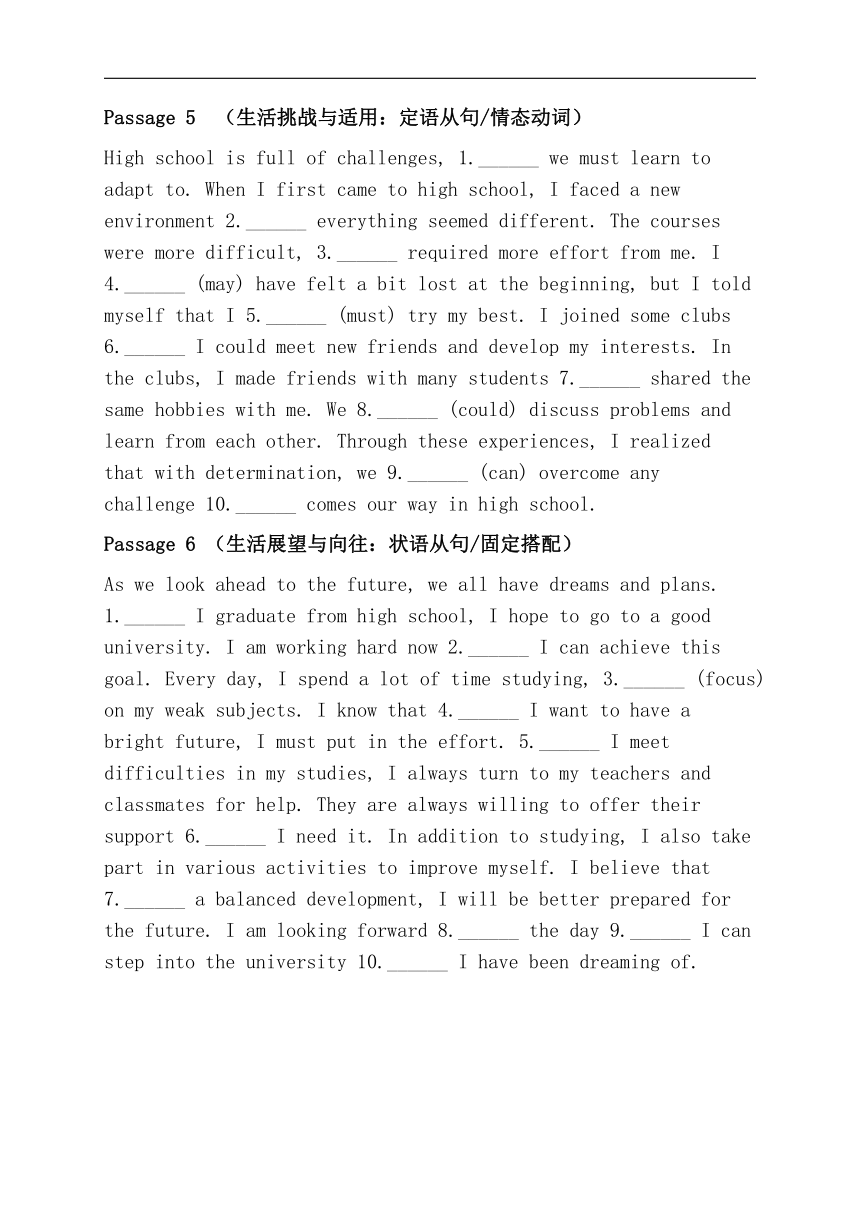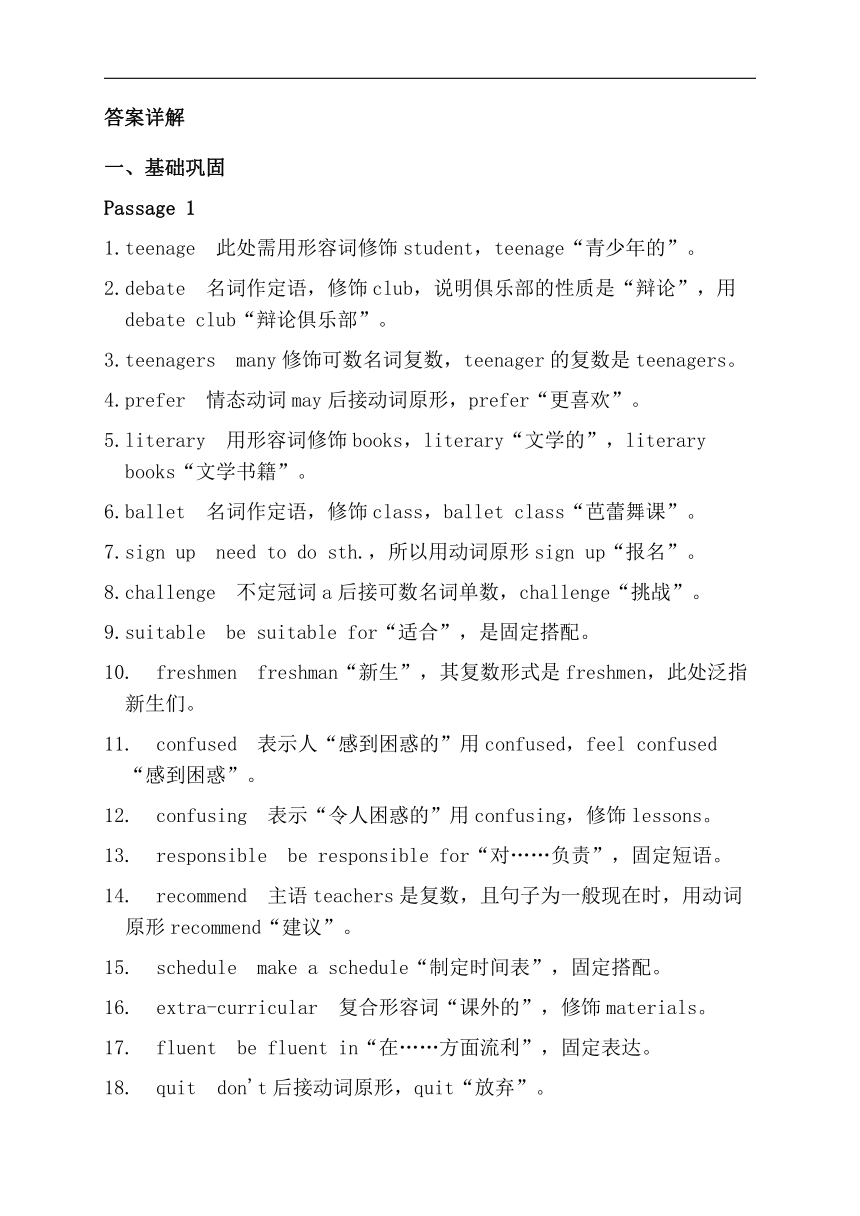Unit1 Teenage Life语法专项练习(含答案)-2025-2026学年高中英语人教版(2019)必修第一册
文档属性
| 名称 | Unit1 Teenage Life语法专项练习(含答案)-2025-2026学年高中英语人教版(2019)必修第一册 |

|
|
| 格式 | docx | ||
| 文件大小 | 29.0KB | ||
| 资源类型 | 教案 | ||
| 版本资源 | 人教版(2019) | ||
| 科目 | 英语 | ||
| 更新时间 | 2025-08-02 17:09:51 | ||
图片预览




文档简介
人教版英语高中必修一Unit1 Teenage Life语法专项练习
一、基础巩固
Passage 1 (青少年生活初认知:名词/副词/形容词)
As a 1.______ (teenage) student starting senior high, you'll face new experiences. There's a 2.______ (debate) club where students practice speaking. Many 3.______ (teenager) join it to build confidence. You may 4.______ (prefer) reading — our library has rich 5.______ (literature) books. For after-school activities, the 6.______ (ballet) class is popular. To join, you need to 7.______ (sign up) first. It's a 8.______ (challenge) but rewarding. Choose what's 9.______ (suitable) for you, and you'll grow quickly.
As 10.______ (freshman), you might feel 11.______ (confused) by 12.______ (confusing) lessons at first. Be 13.______ (responsible) for your study — teachers 14.______ (recommend) making a 15.______ (schedule). Read 16.______ (extra-curricular) materials to improve. If you're 17.______ (fluent) in English, try original stories. Don't 18.______ (quit) when stuck; ask for help. With good plans, you'll make progress.
Passage 2(青少年生活场景日常:一般现在时/现在进行时)
It's a busy morning at school. Right now, some students 1.______ (have) their first class of the day. The teacher 2.______ (explain) a new concept on the blackboard, and the students 3.______ (listen) attentively, taking notes from time to time. In the classroom next door, a group of students 4.______ (discuss) a math problem. They 5.______ (try) different ways to solve it. Meanwhile, in the hallway, two friends 6.______ (chat) about their weekend plans. One says he 7.______ (go) to play basketball with his team every Saturday, and the other 8.______ (reply) that he 9.______ (prefer) to stay at home and read. Every day, students 10.______ (engage) in various activities at school, which 11.______ (help) them grow and learn.
二、能力提升
Passage 3 (兴趣与压力:时态/被动语态)
In high school, students often have many interests. Tom, for example, 1.______ (love) painting. He 2.______ (spend) a lot of his free time in the art club since he entered high school. His paintings 3.______ (praise) by many teachers and classmates. However, high school life is not all about fun. There 4.______ (be) also a lot of pressure. Students 5.______ (require) to study hard to get good grades. They 6.______ (face) many exams and assignments. Tom sometimes 7.______ (feel) stressed, but he 8.______ (know) that he 9.______ (need) to balance his interests and studies. So he 10.______ (make) a schedule to ensure he 11.______ (can) both paint and study well.
Passage 4 (人生成长与感悟:非谓语/词形转换)
Growing up is a process full of experiences. As a high school student, I have learned a lot. I remember 1.______ (fail) an important exam last term. It 2.______ (make) me very sad at first. But instead of 3.______ (give) up, I decided 4.______ (work) harder. I started 5.______ (make) a study plan and 6.______ (follow) it strictly. Day by day, I found myself 7.______ (improve) my learning methods. Now, I am more confident. I believe that every failure 8.______ (be) a chance for growth. With a positive attitude, we can turn difficulties into opportunities 9.______ (achieve) our dreams. It's important 10.______ (keep) learning and growing during our teenage years.
三、拓展应用
Passage 5 (生活挑战与适用:定语从句/情态动词)
High school is full of challenges, 1.______ we must learn to adapt to. When I first came to high school, I faced a new environment 2.______ everything seemed different. The courses were more difficult, 3.______ required more effort from me. I 4.______ (may) have felt a bit lost at the beginning, but I told myself that I 5.______ (must) try my best. I joined some clubs 6.______ I could meet new friends and develop my interests. In the clubs, I made friends with many students 7.______ shared the same hobbies with me. We 8.______ (could) discuss problems and learn from each other. Through these experiences, I realized that with determination, we 9.______ (can) overcome any challenge 10.______ comes our way in high school.
Passage 6 (生活展望与向往:状语从句/固定搭配)
As we look ahead to the future, we all have dreams and plans. 1.______ I graduate from high school, I hope to go to a good university. I am working hard now 2.______ I can achieve this goal. Every day, I spend a lot of time studying, 3.______ (focus) on my weak subjects. I know that 4.______ I want to have a bright future, I must put in the effort. 5.______ I meet difficulties in my studies, I always turn to my teachers and classmates for help. They are always willing to offer their support 6.______ I need it. In addition to studying, I also take part in various activities to improve myself. I believe that 7.______ a balanced development, I will be better prepared for the future. I am looking forward 8.______ the day 9.______ I can step into the university 10.______ I have been dreaming of.
答案详解
一、基础巩固
Passage 1
teenage 此处需用形容词修饰student,teenage“青少年的”。
debate 名词作定语,修饰club,说明俱乐部的性质是“辩论”,用debate club“辩论俱乐部”。
teenagers many修饰可数名词复数,teenager的复数是teenagers。
prefer 情态动词may后接动词原形,prefer“更喜欢”。
literary 用形容词修饰books,literary“文学的”,literary books“文学书籍”。
ballet 名词作定语,修饰class,ballet class“芭蕾舞课”。
sign up need to do sth.,所以用动词原形sign up“报名”。
challenge 不定冠词a后接可数名词单数,challenge“挑战”。
suitable be suitable for“适合”,是固定搭配。
freshmen freshman“新生”,其复数形式是freshmen,此处泛指新生们。
confused 表示人“感到困惑的”用confused,feel confused“感到困惑”。
confusing 表示“令人困惑的”用confusing,修饰lessons。
responsible be responsible for“对……负责”,固定短语。
recommend 主语teachers是复数,且句子为一般现在时,用动词原形recommend“建议”。
schedule make a schedule“制定时间表”,固定搭配。
extra-curricular 复合形容词“课外的”,修饰materials。
fluent be fluent in“在……方面流利”,固定表达。
quit don't后接动词原形,quit“放弃”。
Passage 2
are having 由right now可知用现在进行时,结构为be + doing,主语students是复数,be动词用are,所以填are having。
is explaining 现在进行时,主语the teacher是单数,be动词用is,填is explaining。
are listening 现在进行时,主语students是复数,be动词用are,填are listening。
are discussing 现在进行时,主语a group of students是复数概念,be动词用are,填are discussing。
are trying 现在进行时,主语they是复数,be动词用are,填are trying。
are chatting 现在进行时,主语two friends是复数,be动词用are,填are chatting。
goes 由every Saturday可知用一般现在时,主语he是第三人称单数,动词用第三人称单数形式goes。
replies 一般现在时,主语the other(指另一个人)是第三人称单数,动词用第三人称单数形式replies。
prefers 一般现在时,主语he是第三人称单数,动词用第三人称单数形式prefers。
engage 一般现在时,主语students是复数,用动词原形engage,engage in“参与”。
helps which引导非限制性定语从句,指代前面整个句子,在从句中作主语,谓语动词用第三人称单数形式helps。
二、能力提升
Passage 3
loves 一般现在时,主语Tom是第三人称单数,动词用第三人称单数形式loves。
has spent since引导时间状语从句,主句用现在完成时,结构为have/has + 过去分词,主语He是第三人称单数,助动词用has,spend的过去分词是spent,所以填has spent。
are praised His paintings和praise之间是被动关系,用一般现在时的被动语态,结构为am/is/are + 过去分词,主语paintings是复数,be动词用are,praise的过去分词是praised,所以填are praised。
is there be句型遵循就近原则,pressure是不可数名词,所以be动词用is。
are required students和require之间是被动关系,用一般现在时的被动语态,主语students是复数,be动词用are,require的过去分词是required,所以填are required。
face 一般现在时,主语They是复数,用动词原形face。
feels 一般现在时,主语Tom是第三人称单数,动词用第三人称单数形式feels。
knows 一般现在时,主语he是第三人称单数,动词用第三人称单数形式knows。
needs 一般现在时,主语he是第三人称单数,动词用第三人称单数形式needs。
makes 一般现在时,主语he是第三人称单数,动词用第三人称单数形式makes。
can 情态动词没有人称和数的变化,用原形can。
Passage 4
failing remember doing sth. “记得做过某事”,所以用动名词failing。
made 根据last term可知用一般过去时,make的过去式是made。
giving instead of是介词短语,后接动名词,give的动名词是giving。
to work decide to do sth. “决定做某事”,所以用to work。
making start doing sth. “开始做某事”,所以用making。
followed and连接并列谓语,根据started可知用一般过去时,follow的过去式是followed。
improving find sb. doing sth. “发现某人正在做某事”,所以用improving。
is 主语every failure是第三人称单数,一般现在时中be动词用is。
to achieve 此处用动词不定式作目的状语,所以填to achieve。
to keep It's + adj. + to do sth. “做某事是……的”,所以用to keep。
三、拓展应用
Passage 5
which 先行词是challenges,在定语从句中作宾语,非限制性定语从句用which引导。
where 先行词是environment,在定语从句中作地点状语,用关系副词where引导。
which 先行词是前面整个句子,在非限制性定语从句中作主语,用which引导。
might 此处表示过去“可能”,用may的过去式might。
must 表示“必须”,用must。
where 先行词是clubs,在定语从句中作地点状语,用关系副词where引导。
who/that 先行词是students,在定语从句中作主语,用关系代词who或that引导。
could 表示过去“能够”,用can的过去式could。
can 表示“能够”,用原形can。
that/which 先行词是challenge,在定语从句中作主语,用关系代词that或which引导。
Passage 6
When 引导时间状语从句,表示“当……时候”,用when。
so that 引导目的状语从句,表示“以便,为了”,用so that。
focusing 此处用现在分词作伴随状语,focus的现在分词是focusing。
if 引导条件状语从句,表示“如果”,用if。
When/Whenever 引导时间状语从句,表示“当……时候/无论何时”,用When或Whenever。
whenever 引导时间状语从句,表示“无论何时”,用whenever。
with with a balanced development“随着全面发展”,with表示“随着”。
to look forward to“期待”,固定短语。
when 先行词是the day,在定语从句中作时间状语,用关系副词when引导。
that/which 先行词是university,在定语从句中作宾语,用关系代词that或which引导 。
一、基础巩固
Passage 1 (青少年生活初认知:名词/副词/形容词)
As a 1.______ (teenage) student starting senior high, you'll face new experiences. There's a 2.______ (debate) club where students practice speaking. Many 3.______ (teenager) join it to build confidence. You may 4.______ (prefer) reading — our library has rich 5.______ (literature) books. For after-school activities, the 6.______ (ballet) class is popular. To join, you need to 7.______ (sign up) first. It's a 8.______ (challenge) but rewarding. Choose what's 9.______ (suitable) for you, and you'll grow quickly.
As 10.______ (freshman), you might feel 11.______ (confused) by 12.______ (confusing) lessons at first. Be 13.______ (responsible) for your study — teachers 14.______ (recommend) making a 15.______ (schedule). Read 16.______ (extra-curricular) materials to improve. If you're 17.______ (fluent) in English, try original stories. Don't 18.______ (quit) when stuck; ask for help. With good plans, you'll make progress.
Passage 2(青少年生活场景日常:一般现在时/现在进行时)
It's a busy morning at school. Right now, some students 1.______ (have) their first class of the day. The teacher 2.______ (explain) a new concept on the blackboard, and the students 3.______ (listen) attentively, taking notes from time to time. In the classroom next door, a group of students 4.______ (discuss) a math problem. They 5.______ (try) different ways to solve it. Meanwhile, in the hallway, two friends 6.______ (chat) about their weekend plans. One says he 7.______ (go) to play basketball with his team every Saturday, and the other 8.______ (reply) that he 9.______ (prefer) to stay at home and read. Every day, students 10.______ (engage) in various activities at school, which 11.______ (help) them grow and learn.
二、能力提升
Passage 3 (兴趣与压力:时态/被动语态)
In high school, students often have many interests. Tom, for example, 1.______ (love) painting. He 2.______ (spend) a lot of his free time in the art club since he entered high school. His paintings 3.______ (praise) by many teachers and classmates. However, high school life is not all about fun. There 4.______ (be) also a lot of pressure. Students 5.______ (require) to study hard to get good grades. They 6.______ (face) many exams and assignments. Tom sometimes 7.______ (feel) stressed, but he 8.______ (know) that he 9.______ (need) to balance his interests and studies. So he 10.______ (make) a schedule to ensure he 11.______ (can) both paint and study well.
Passage 4 (人生成长与感悟:非谓语/词形转换)
Growing up is a process full of experiences. As a high school student, I have learned a lot. I remember 1.______ (fail) an important exam last term. It 2.______ (make) me very sad at first. But instead of 3.______ (give) up, I decided 4.______ (work) harder. I started 5.______ (make) a study plan and 6.______ (follow) it strictly. Day by day, I found myself 7.______ (improve) my learning methods. Now, I am more confident. I believe that every failure 8.______ (be) a chance for growth. With a positive attitude, we can turn difficulties into opportunities 9.______ (achieve) our dreams. It's important 10.______ (keep) learning and growing during our teenage years.
三、拓展应用
Passage 5 (生活挑战与适用:定语从句/情态动词)
High school is full of challenges, 1.______ we must learn to adapt to. When I first came to high school, I faced a new environment 2.______ everything seemed different. The courses were more difficult, 3.______ required more effort from me. I 4.______ (may) have felt a bit lost at the beginning, but I told myself that I 5.______ (must) try my best. I joined some clubs 6.______ I could meet new friends and develop my interests. In the clubs, I made friends with many students 7.______ shared the same hobbies with me. We 8.______ (could) discuss problems and learn from each other. Through these experiences, I realized that with determination, we 9.______ (can) overcome any challenge 10.______ comes our way in high school.
Passage 6 (生活展望与向往:状语从句/固定搭配)
As we look ahead to the future, we all have dreams and plans. 1.______ I graduate from high school, I hope to go to a good university. I am working hard now 2.______ I can achieve this goal. Every day, I spend a lot of time studying, 3.______ (focus) on my weak subjects. I know that 4.______ I want to have a bright future, I must put in the effort. 5.______ I meet difficulties in my studies, I always turn to my teachers and classmates for help. They are always willing to offer their support 6.______ I need it. In addition to studying, I also take part in various activities to improve myself. I believe that 7.______ a balanced development, I will be better prepared for the future. I am looking forward 8.______ the day 9.______ I can step into the university 10.______ I have been dreaming of.
答案详解
一、基础巩固
Passage 1
teenage 此处需用形容词修饰student,teenage“青少年的”。
debate 名词作定语,修饰club,说明俱乐部的性质是“辩论”,用debate club“辩论俱乐部”。
teenagers many修饰可数名词复数,teenager的复数是teenagers。
prefer 情态动词may后接动词原形,prefer“更喜欢”。
literary 用形容词修饰books,literary“文学的”,literary books“文学书籍”。
ballet 名词作定语,修饰class,ballet class“芭蕾舞课”。
sign up need to do sth.,所以用动词原形sign up“报名”。
challenge 不定冠词a后接可数名词单数,challenge“挑战”。
suitable be suitable for“适合”,是固定搭配。
freshmen freshman“新生”,其复数形式是freshmen,此处泛指新生们。
confused 表示人“感到困惑的”用confused,feel confused“感到困惑”。
confusing 表示“令人困惑的”用confusing,修饰lessons。
responsible be responsible for“对……负责”,固定短语。
recommend 主语teachers是复数,且句子为一般现在时,用动词原形recommend“建议”。
schedule make a schedule“制定时间表”,固定搭配。
extra-curricular 复合形容词“课外的”,修饰materials。
fluent be fluent in“在……方面流利”,固定表达。
quit don't后接动词原形,quit“放弃”。
Passage 2
are having 由right now可知用现在进行时,结构为be + doing,主语students是复数,be动词用are,所以填are having。
is explaining 现在进行时,主语the teacher是单数,be动词用is,填is explaining。
are listening 现在进行时,主语students是复数,be动词用are,填are listening。
are discussing 现在进行时,主语a group of students是复数概念,be动词用are,填are discussing。
are trying 现在进行时,主语they是复数,be动词用are,填are trying。
are chatting 现在进行时,主语two friends是复数,be动词用are,填are chatting。
goes 由every Saturday可知用一般现在时,主语he是第三人称单数,动词用第三人称单数形式goes。
replies 一般现在时,主语the other(指另一个人)是第三人称单数,动词用第三人称单数形式replies。
prefers 一般现在时,主语he是第三人称单数,动词用第三人称单数形式prefers。
engage 一般现在时,主语students是复数,用动词原形engage,engage in“参与”。
helps which引导非限制性定语从句,指代前面整个句子,在从句中作主语,谓语动词用第三人称单数形式helps。
二、能力提升
Passage 3
loves 一般现在时,主语Tom是第三人称单数,动词用第三人称单数形式loves。
has spent since引导时间状语从句,主句用现在完成时,结构为have/has + 过去分词,主语He是第三人称单数,助动词用has,spend的过去分词是spent,所以填has spent。
are praised His paintings和praise之间是被动关系,用一般现在时的被动语态,结构为am/is/are + 过去分词,主语paintings是复数,be动词用are,praise的过去分词是praised,所以填are praised。
is there be句型遵循就近原则,pressure是不可数名词,所以be动词用is。
are required students和require之间是被动关系,用一般现在时的被动语态,主语students是复数,be动词用are,require的过去分词是required,所以填are required。
face 一般现在时,主语They是复数,用动词原形face。
feels 一般现在时,主语Tom是第三人称单数,动词用第三人称单数形式feels。
knows 一般现在时,主语he是第三人称单数,动词用第三人称单数形式knows。
needs 一般现在时,主语he是第三人称单数,动词用第三人称单数形式needs。
makes 一般现在时,主语he是第三人称单数,动词用第三人称单数形式makes。
can 情态动词没有人称和数的变化,用原形can。
Passage 4
failing remember doing sth. “记得做过某事”,所以用动名词failing。
made 根据last term可知用一般过去时,make的过去式是made。
giving instead of是介词短语,后接动名词,give的动名词是giving。
to work decide to do sth. “决定做某事”,所以用to work。
making start doing sth. “开始做某事”,所以用making。
followed and连接并列谓语,根据started可知用一般过去时,follow的过去式是followed。
improving find sb. doing sth. “发现某人正在做某事”,所以用improving。
is 主语every failure是第三人称单数,一般现在时中be动词用is。
to achieve 此处用动词不定式作目的状语,所以填to achieve。
to keep It's + adj. + to do sth. “做某事是……的”,所以用to keep。
三、拓展应用
Passage 5
which 先行词是challenges,在定语从句中作宾语,非限制性定语从句用which引导。
where 先行词是environment,在定语从句中作地点状语,用关系副词where引导。
which 先行词是前面整个句子,在非限制性定语从句中作主语,用which引导。
might 此处表示过去“可能”,用may的过去式might。
must 表示“必须”,用must。
where 先行词是clubs,在定语从句中作地点状语,用关系副词where引导。
who/that 先行词是students,在定语从句中作主语,用关系代词who或that引导。
could 表示过去“能够”,用can的过去式could。
can 表示“能够”,用原形can。
that/which 先行词是challenge,在定语从句中作主语,用关系代词that或which引导。
Passage 6
When 引导时间状语从句,表示“当……时候”,用when。
so that 引导目的状语从句,表示“以便,为了”,用so that。
focusing 此处用现在分词作伴随状语,focus的现在分词是focusing。
if 引导条件状语从句,表示“如果”,用if。
When/Whenever 引导时间状语从句,表示“当……时候/无论何时”,用When或Whenever。
whenever 引导时间状语从句,表示“无论何时”,用whenever。
with with a balanced development“随着全面发展”,with表示“随着”。
to look forward to“期待”,固定短语。
when 先行词是the day,在定语从句中作时间状语,用关系副词when引导。
that/which 先行词是university,在定语从句中作宾语,用关系代词that或which引导 。
